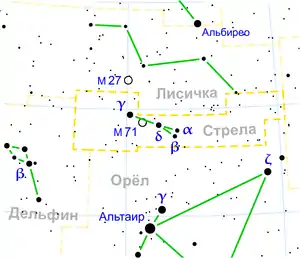Гамма Стрелы
Гамма Стрелы (лат. γ Sagittae) — ярчайшая звезда созвездия Стрелы. Это одиночная звезда[12], она видна невооружённым глазом и обладает видимой звёздной величиной +3,47[2]. На основе измерения годичного параллакса (12,62 мсд) была получена оценка расстояния, равная 258 световым годам. Звезда приближается к Солнцу и обладает лучевой скоростью −34 км/с[3].
| Гамма Стрелы | |
|---|---|
| Звезда | |
 | |
| Наблюдательные данные (Эпоха J2000.0) |
|
| Прямое восхождение | 19ч 58м 45,43с[1] |
| Склонение | +19° 29′ 31,73″[1] |
| Расстояние | 258 ± 4 св. лет (79 ± 1 пк) |
| Видимая звёздная величина (V) | +3,47[2] |
| Созвездие | Стрела |
| Астрометрия | |
| Лучевая скорость (Rv) | −34,0 ± 0,2[3] км/c |
| Собственное движение | |
| • прямое восхождение | 66,21 ± 0,14[1] mas в год |
| • склонение | 22,22 ± 0,12[1] mas в год |
| Параллакс (π) | 12,62 ± 0,18[1] mas |
| Абсолютная звёздная величина (V) | −1,11[4] |
| Спектральные характеристики | |
| Спектральный класс | M0III[5][6][7] |
| Показатель цвета | |
| • B−V | +1,57[2] |
| • U−B | +1,93[2] |
| Физические характеристики | |
| Масса | 1,37[8] M⊙ |
| Радиус | 55,13 ± 3,29[9] R⊙ |
| Возраст | 2,35[6] млрд лет |
| Температура | 3932 К[10] |
| Светимость | 562 ± 75[9] L⊙ |
| Металличность | −0,14[9] |
| Вращение | 5,8 км/с[11] |
| Коды в каталогах | |
| BD +19° 4229, FK5 752, HD 189319, HIP 98337, HR 7635, PPM 137344, SAO 105500, GC 27672 | |
| Информация в базах данных | |
| SIMBAD | данные |
Это красный гигант спектрального класса M0 III[13][14]. Вероятно, звезда находится на стадии ветви красных гигантов, при этом водород в ней горит в оболочке вокруг ядра[15].
Возраст звезды оценивается в 2,35[6] миллиарда лет, масса в 1,37[8] раз превышает солнечную, а радиус равен 55[9] радиусам Солнца. Светимость в 562[9] раза превышает светимость Солнца, эффективная температура атмосферы составляет 3862 K[6].
Примечания
- van Leeuwen, F. Validation of the New Hipparcos Reduction (англ.) // Astronomy and Astrophysics. — 2007. — Vol. 474, no. 2. — P. 653—664. — doi:10.1051/0004-6361:20078357. — . — arXiv:0708.1752.
- Ducati, J. R. VizieR Online Data Catalog: Catalogue of Stellar Photometry in Johnson's 11-color system (англ.) // CDS/ADC Collection of Electronic Catalogues : journal. — 2002. — Vol. 2237. — .
- Famaey, B.; Jorissen, A.; Luri, X.; Mayor, M.; Udry, S.; Dejonghe, H.; Turon, C. Local kinematics of K and M giants from CORAVEL/Hipparcos/Tycho-2 data. Revisiting the concept of superclusters (англ.) // Astronomy and Astrophysics : journal. — 2005. — Vol. 430. — P. 165. — doi:10.1051/0004-6361:20041272. — . — arXiv:astro-ph/0409579.
- Setiawan, J.; Pasquini, L.; da Silva, L. & Hatzes, A. P. (July 2004), Precise radial velocity measurements of G and K giants. Multiple systems and variability trend along the Red Giant Branch, Astronomy and Astrophysics Т. 421: 241–254, DOI 10.1051/0004-6361:20041042-1
- Keenan, Philip C.; McNeil, Raymond C. The Perkins catalog of revised MK types for the cooler stars (англ.) // The Astrophysical Journal : journal. — IOP Publishing, 1989. — Vol. 71. — P. 245. — doi:10.1086/191373. — .
- Luck, R. Earle. Abundances in the Local Region. I. G and K Giants (англ.) // Astronomical Journal. — 2015. — Vol. 150, no. 3. — P. 88. — doi:10.1088/0004-6256/150/3/88. — . — arXiv:1507.01466.
- Skiff, B. A. VizieR Online Data Catalog: Catalogue of Stellar Spectral Classifications (Skiff, 2009-2016) (англ.) // VizieR On-line Data Catalog: B/mk. Originally Published in: Lowell Observatory (October 2014) : journal. — 2014. — Vol. 1. — .
- Reffert, Sabine; Bergmann, Christoph; Quirrenbach, Andreas; Trifonov, Trifon; Künstler, Andreas. Precise radial velocities of giant stars. VII. Occurrence rate of giant extrasolar planets as a function of mass and metallicity (англ.) // Astronomy and Astrophysics : journal. — 2015. — Vol. 574. — P. A116. — doi:10.1051/0004-6361/201322360. — . — arXiv:1412.4634.
- Piau, L.; Kervella, P.; Dib, S.; Hauschildt, P. Surface convection and red-giant radius measurements (англ.) // Astronomy and Astrophysics : journal. — 2011. — Vol. 526. — P. 12. — doi:10.1051/0004-6361/201014442. — . — arXiv:1010.3649.
- Boeche C., Grebel E. K. SP_Ace: a new code to derive stellar parameters and elemental abundances (англ.) // Astron. Astrophys. / T. Forveille — EDP Sciences, 2016. — Vol. 587. — P. 2–2. — ISSN 0004-6361; 0365-0138; 1432-0746; 1286-4846 — doi:10.1051/0004-6361/201526758 — arXiv:1512.01546
- Massarotti A., Latham D. W., Stefanik R. P., Fogel J. Rotational and radial velocities for a sample of 761 Hipparcos giants and the role of binarity (англ.) // Astron. J. / J. G. III, E. Vishniac — IOP Publishing, American Astronomical Society, University of Chicago Press, AIP, 2007. — Vol. 135, Iss. 1. — P. 209–231. — ISSN 0004-6256; 1538-3881 — doi:10.1088/0004-6256/135/1/209
- Eggleton, P. P. & Tokovinin, A. A. (September 2008), A catalogue of multiplicity among bright stellar systems, Monthly Notices of the Royal Astronomical Society Т. 389 (2): 869–879, DOI 10.1111/j.1365-2966.2008.13596.x
- Wittkowski, M.; Hummel, C. A.; Aufdenberg, J. P. & Roccatagliata, V. (December 2006), Tests of stellar model atmospheres by optical interferometry. III. NPOI and VINCI interferometry of the M0 giant γ Sagittae covering 0.5-2.2 μm, Astronomy and Astrophysics Т. 460 (3): 843–853, DOI 10.1051/0004-6361:20065853
- Strassmeier, K. G.; Ilyin, I.; Weber, M. PEPSI deep spectra. II. Gaia benchmark stars and other M-K standards (англ.) // Astronomy and Astrophysics : journal. — 2018. — Vol. 612. — P. A45. — doi:10.1051/0004-6361/201731633. — . — arXiv:1712.06967.
- Stock, Stephan; Reffert, Sabine; Quirrenbach, Andreas; Hauschildt, P. Precise radial velocities of giant stars. X. Bayesian stellar parameters and evolutionary stages for 372 giant stars from the Lick planet search (англ.) // Astronomy and Astrophysics : journal. — 2018. — Vol. 616. — P. A33. — doi:10.1051/0004-6361/201833111. — . — arXiv:1805.04094.